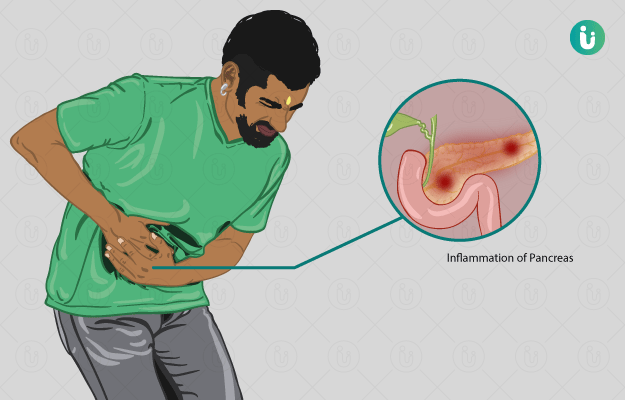What is Pancreatitis?
Digestive enzymes and hormones are secreted by the pancreas. Sometimes, digestive enzymes cause harm to the internal lining of the pancreas causing inflammation and this pathological condition is known as pancreatitis. It can be acute or chronic. Pancreatitis is not so common among digestive disorders and is, thus, a condition needing immediate medical attention at a hospital.
What are its main signs and symptoms?
Some of the common signs and symptoms are:
- Severe upper abdominal and back pain
- Swollen abdomen
- Nausea
- Rapid heartbeat
- Vomiting
- Fever
- Diarrhoea
- Weight loss
- Breathlessness
- Blocking of the pancreas or gall bladder ducts
- Collapse
- Excessive sweating
What are the main causes?
The common causes of pancreatitis are :
- Alcohol consumption
- Gallbladder stones
- Hereditary problems of the pancreas
- Side effects of medicines
- Abdominal injury
- Pancreatic cancer
- Hyperglycaemia and Hypertriglyceridemia
- Mumps
How is it diagnosed and treated?
There are 2 types of pancreatitis – acute and chronic. Acute pancreatitis occurs when there is a sudden and severe injury in the abdomen. It can lead to failure of heart or kidney. Chronic pancreatitis occurs due to heavy consumption of alcohol. It occurs over long periods of time and the chances of improvement and healing are usually poor. Physical examination is followed by a series of investigations to confirm the diagnosis.
The diagnosis of pancreatitis can be done by :
- MRI scan – It gives the doctors information about the actual cause of the disease after observing the images of the ducts.
- Ultrasound of the abdomen – It helps in the detection of gall bladder stones.
- CT scan – It helps in taking 3-D images of the gland.
- Some more tests like X-rays, and amylase level blood tests are also done to confirm the diagnosis of pancreatitis.
After the diagnosis, it is treated by various methods such as :
- Surgery – Usually, the gall bladder is removed after detecting stones. Also, the injured areas of the pancreas are removed, if possible.
- Endoscopy – To remove the gall bladder stones.
- Intravenous fluids – This helps in settling inflammation.
- Analgesics (pain relievers) for pain relief.
Lifestyle changes that are a must post discharge and once acute pancreatitis has been controlled in the hospital are
- Quitting alcohol
- Avoiding fatty foods.

 Doctors for Pancreatitis
Doctors for Pancreatitis  OTC Medicines for Pancreatitis
OTC Medicines for Pancreatitis



















